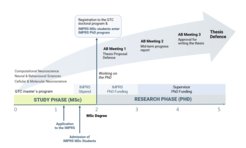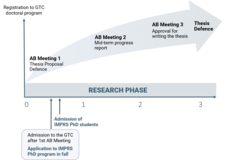
Structure
Entry of Master students to the IMPRS program
GTC MSc students follow the curriculum of one of the three GTC MSc programs during their first two years (including courses, rotations and a 6 month-long MSc project):
- Computational Neuroscience
- Neural & Behavioural Sciences
- Cellular & Molecular Neuroscience
In the fourth semester, selected GTC MSc students enter the IMPRS program and become IMPRS scholars. The students receive a stipend during their 4th semester (starting in 2026) and funds for a one-year PhD position. During the 4th semester, IMPRS students apply to PI’s of the IMPRS faculty to secure a PhD project and funding for a PhD position beyond the IMPRS funding. They will be integrated from the 4th semester into the IMPRS community and connect and network with IMPRS PhD students on the IMPRS events. IMPRS Master students enter the PhD program after their successful MSc graduation

Entry of PhD students to the IMPRS program
GTC doctoral students supervised by IMPRS faculty members are invited to apply for direct access to the PhD program. Selected doctoral students benefit from the grants, networking events and additional training of the IMPRS.
If you are already holding an excellent MSc degree and would like to apply for the PhD program of the IMPRS, you are very welcome to apply directly for a PhD position advertised by the IMPRS faculty. If you get an offer from IMPRS faculty member, you are also eligible to enroll in the GTC doctoral program and apply for the IMPRS PhD program.

PhD program
The core focus of the PhD research phase will be independent research. This research will take place over approximately three years and culminate in a doctoral dissertation and the degree ‘Doctor of Natural Sciences in Neuroscience’ (Dr. rer. nat.) which is equivalent to the international academic degree ‘Doctor of Philosophy’ (PhD).
Potential research topics cover a variety of fields in systems neuroscience, cognitive and behavioral neuroscience, computational neuroscience, translational and clinical neuroscience as well as cellular and molecular neuroscience.
In addition to ongoing support from their primary advisor, doctoral candidates benefit from regular interaction with an Advisory Board, a cross-institutional panel that includes three or more senior scientists. Members of this board contribute interdisciplinary and methodological expertise, independent guidance and supervision for the student. During the research phase, doctoral students will be offered a wide spectrum of training courses complementing their training in the labs.

